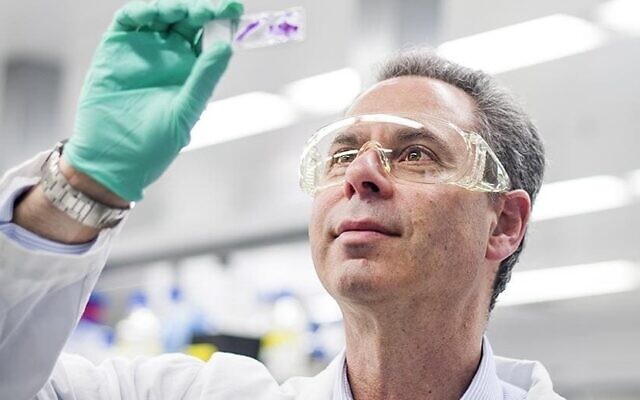‘This could make a huge difference’
Women – and men – with Ashkenazi Jewish ancestry are 10 times more likely than the general population to carry a faulty BRCA1 or BRCA2 gene.
“YOU wouldn’t get on a plane that had a 70 per cent chance of crashing, why would you live your life with a 70 per cent risk of getting cancer?”
It was this consideration that led Amanda Isenberg, a BRCA gene mutation carrier, to undergo a mastectomy three years ago.
Her maternal grandmother had had non-terminal breast cancer, and her mother had been found to have the mutation, so Isenberg said she was expecting her own result to be positive.
Isenberg, who waited until she had her children to undergo the procedure, counts herself as “very lucky”.
“I’ve had friends who’ve found out [about the mutation] after they already had cancer, or friends who are going through the surgery preventatively and then they found the cancer; there’s so many stories that are worse than mine,” she said.
Women – and men – with Ashkenazi Jewish ancestry are 10 times more likely than the general population to carry a faulty BRCA1 or BRCA2 gene.
Now, a new clinical trial hopes to offer women with the mutation an option other than a mastectomy.
“For people who wouldn’t consider having the mastectomy, I think having another option for them is incredible,” Isenberg said.
The trial aims to test the effectiveness of a drug called Denosumab, currently used to treat osteoporosis, that neutralises a molecule called RANK ligand. Recent studies suggest switching off RANK ligand could also target the culprit cell that gives rise to breast cancer in women with the BRCA1 mutation.
“I am hopeful that this approach could delay or even prevent breast cancer in women who carry a faulty BRCA1 gene,” said trial study chair Professor Geoffrey Lindeman.
“Even if we were able to ‘buy time’ for women considering a mastectomy, that would be an important outcome.”
Professor Lesley Andrews of the Hereditary Cancer Clinic at Prince of Wales Hospital said, “This could potentially make a huge difference if the trial confirms what the early studies have shown.”
She said as Denosumab has already been used for many years, “the safety and side-effect profile of the drug is already known”, meaning there could be “a fairly efficient turnaround time to get it approved” if the trial is successful.
“For those women who aren’t considering having a bilateral mastectomy in the next five years, we would like to hear from them if they’re interested in participating,” she said.
Andrews also encouraged members of the Jewish community who have not been tested for a BRCA mutation to contact Jenescreen or the Hereditary Cancer Clinic.
Trial info: breastolution.com.au. Testing: jenescreen.com.au.


comments